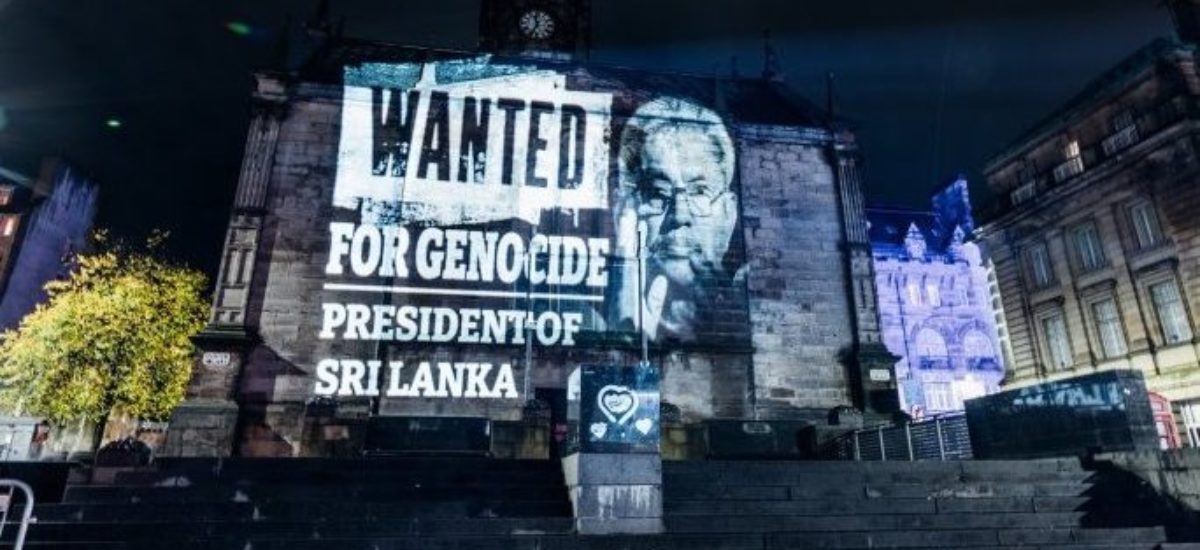Photo courtesy of GHRTV
President Gotabaya Rajapaksa’s visit to Scotland for an international environmental summit put the regime’s grim human rights track record in the spotlight. Failure to care for the environment has already been noted. As campaigners held rallies, ran newspaper advertisements and projected a ‘Wanted’ notice on to the Scottish parliament building, broader abuses drew global attention, although pro-LTTE flag waving by some protestors weakened the impact. Ministers struck a more conciliatory tone than usual, including offering to talk to at least some in the diaspora. However whether this is a ploy to hang on to valuable trade deals and other benefits, with little real change, remains to be seen.
The 26th UN Climate Change Conference of the Parties (COP26), being hosted by the UK in Glasgow, Scotland, from October 31 to November 12, has been a focus of worldwide attention. For many people the outcome will be vitally important to their wellbeing and survival. Yet some governments appear to have focused less on tackling the threats to humankind and more on trying to defend or improve their own reputations and sidestep criticism. There have also been opportunities for diplomacy on a number of issues from global warming to other sources of tension.
The Sri Lankan regime has lost much popularity at home, even among the Sinhalese Buddhist majority, and credibility abroad. Economic failures, mishandling of the pandemic, rifts with allies, authoritarian rule and ongoing human rights abuses have left the government vulnerable and less able to silence or ignore its critics. The potential loss of the European Union’s Generalised Scheme of Preferences (GSP)+ trade scheme as a result of top politicians’ failings would further devastate the economy.
The UK is one of several countries with sizeable Sri Lankan communities of varying ethnicities and political views. Many (mainly but not solely Tamils) have lobbied for greater accountability for those responsible for torture and killing of civilians and other abuses. Some of its neighbours were also shocked by atrocities committed by the government as well as LTTE forces and dismayed by ongoing injustices.
Shortly before the summit, Foreign Minister GL Peiris met UK Foreign Secretary Liz Truss. He promised progress on human rights, including reform of the Prevention of Terrorism Act, and claimed that the President had encouraged him to engage in dialogue with the diaspora.
However, earlier in October, he had ruled out talks with groups banned by the Ministry of Defence, such as the Global Tamil Forum. It might seem that dialogue is all the more important amid bitter divisions, offering a chance of building trust and resolving conflicts non-violently. It is not clear with whom the Sri Lankan authorities might be willing to talk, given their history of alienating minorities, yet maybe there are openings.
Meanwhile, the diaspora took out an advertisement in a Scottish newspaper condemning the misdeeds of the Sri Lankan state, which took out its own counter-advertisement. “Wanted for Genocide, President of Sri Lanka” was projected on to the side of the Scottish Parliament in Edinburgh.
As COP26 got underway, tough questions were being asked about why Scotland’s police were training Sri Lankan officers who committed torture, with devastating consequences. Not only in Glasgow but also in the town of Dunblane, the location of President Rajapaksa’s hotel, protestors gathered and a van drove by with a van displaying a digital sign: “War criminals are not welcomed in Scotland; a land of freedom, justice and equality”.
The rallies might have been more effective if some of those present had not been waving the flag of the LTTE, whose power hungry leaders also committed numerous human rights abuses and tyrannised the Tamils they claimed to defend. Some of the diaspora are survivors of the LTTE’s attempts to stamp out dissent. Many overseas Sri Lankans remain in denial about the cruelties inflicted by commanders on both sides that resulted in tragedy for ordinary soldiers and defenceless civilians. Others, however, are aware, as are many concerned UK residents of other ethnicities.
The media coverage of protests against President Rajapaksa and other delegates from Sri Lanka to COP26 is a reminder that accountability for abuses cannot be avoided for ever. The summit also highlights the many ways in which humans of all backgrounds are interconnected and the importance of valuing everyone and working together to counter the threats to survival. The government continues to send mixed messages, raising doubts about its sincerity about seeking reconciliation. Yet perhaps events in Scotland will put pressure on the authorities to act at more humanely and draw international attention to the quest for justice for the economically impoverished, minorities and others are currently suffering in Sri Lanka.


